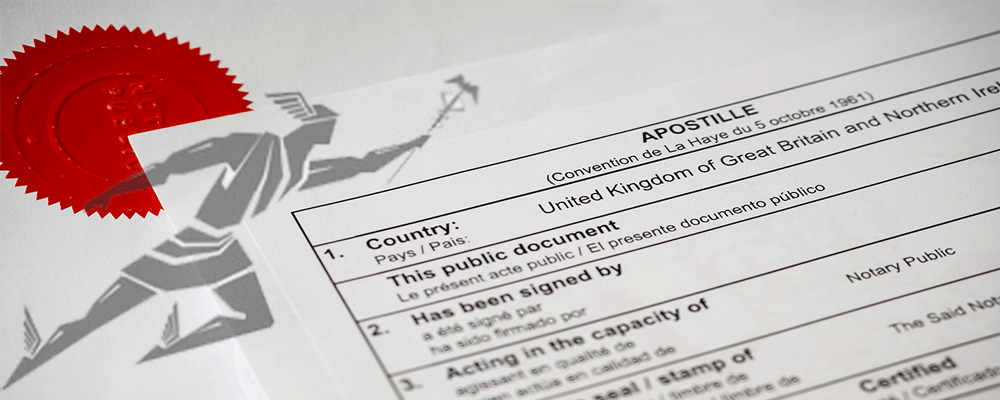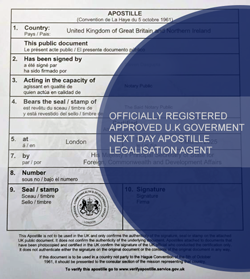Hague Apostille Services
Apostille Direct London provides fast, reliable, and professional Hague Apostille services for all your document legalisation needs. Whether you require your documents for business, education, or personal use abroad, we ensure they are fully legalised and accepted in Hague Convention member countries.

What is a Hague Apostille?
A Hague Apostille is a certificate issued under the Hague Convention of 1961 that authenticates the origin of a public document for use in another country. It confirms the authenticity of signatures, stamps, or seals on your documents, ensuring they are recognised internationally by member countries of the Hague Convention.
Why is a Hague Apostille Needed?
Apostille certification is essential for documents being used abroad in official capacities. This includes:
• Business transactions.
• Employment overseas.
• Immigration or visa applications.
• Education and university admissions.
• Marriage abroad.
• Power of attorney and legal agreements.
Documents We Can Apostille
We can assist with a wide range of documents, including:
• Birth, marriage, and death certificates.
• Academic degrees, diplomas, and transcripts.
• Criminal record checks.
• Business documents (e.g., certificates of incorporation).
• Power of attorney and legal contracts.
How Our Hague Apostille Service Works
1. Submit Your Document: Visit our office or send your documents via courier.
2. Document Processing: Our team authenticates your document and secures the apostille certificate.
3. Delivery: We ensure your documents are safely returned, ready for international use.
Why Choose Apostille Direct London?
• Fast Turnaround: We process most documents in 1-2 working days.
• Expert Team: Our experienced professionals ensure accuracy and compliance with international standards.
• Convenient Location: Our office is centrally located near Charing Cross Station for easy access.
• Secure Services: Your documents are handled with the utmost care and confidentiality.
Contact Us
Need a Hague Apostille?

Contact our friendly team today for fast and efficient service:
• Phone:
•Email: hello@apostille-direct.london.
• Visit Us: Room 102, 8 Duncannon Street, WC2N 4JF, London.
HISTORY OF THE APOSTILLE – from the 1961 Hague Convention to the advent of the E-Apostille
The origins of the Apostille can be traced to the 1961 Hague Convention, also known as the Apostille Convention, Which is an international treaty that simplified the process of accepting documents from one country in another country.
The convention was drafted by the Hague Conference on Private International Law (HCCH).
The 1961 Hague Convention established a system whereby a document issued in one contracting state can be certified for legal use in other contracting states without requiring additional certification. This certification, known as an apostille, is similar to a notarisation.
The 1961 Hague Convention has significantly streamlined bureaucratic processes in international relations, establishing it as a vital framework for global collaboration.
The term “apostille” originates from the French word apostille, meaning “a marginal or bottom note.”
A certification under the convention is known as an apostille or Hague apostille. It serves as an international certification similar to notarization and can complement the local notarisation of a document.
When the convention is applicable between two members states of the 1961 Hague Convention, an apostille issued by the state of origin is legally sufficient to certify the document, eliminating the need for additional certification by the destination member state’s embassy or consulate e.g. the require for “Consulate Legalisation” is avoided between members of the 1961 Hague Convention.
1961 Hague Convention summary
- Establishment of Apostille Legalisation system between member states:
- The Apostille Convention, developed by the Hague Conference on Private International Law (HCCH), aims to streamline the legalisation process by replacing it with a certification known as an Apostille, issued by a designated authority in the country of origin.
- The Apostille Convention removed the requirement for diplomatic or consular legalisation of public documents.
- The Apostille Convention established the international apostille system, which certifies the authenticity of documents between member states for use in each others countries.
- Apostille Certificate:
- An apostille legalisation certificate is a standardised certificate issued by a designated authority in the originating member state country.
- An apostille legalisation certificate is attached to the public document or added as an extra page and confirms the document’s authenticity without requiring additional legalisation from the consulate of a member state.
- Types of Public Documents covered by the Apostille Convention:
- Birth Certificates, Marriage Certificates, Death Certificates,
- Court Orders
- Academic Degress Certificates certified by a Notary Public
- Notarial acts
- Application of the Apostille Convention:
- The Apostille Convention applies exclusively to documents exchanged between member states.
- At 01 January 2025 numerous countries worldwide are part of the Apostille Convention and it’s membership grows annually, simplifying the global process of document recognition and authenticiation throughout the world.
- Streamlining the recognition of legal documents internationally:
- By replacing a lengthy and complex legalisation process with a straightforward Apostille certificate, the Apostille Convention streamlines international transactions, travel, education, and legal matters.
A list of countries who have joined the Hague Convention is recorded by The Hague Conference on Private International Law (HCCH) and can be found at the following link:
https://www.hcch.net/en/instruments/conventions/status-table/?cid=41
Countries who have not joined the Apostille Convention
Countries who are not members of the Apostille Convention require the verification of the authenticity of foreign documents, in a procedure called legalisation, for the document to be legally valid there.
This legalisation is generally a chain of certifications, by one or more authorities of the state where the document was issued and then subsequently by the consulate or embassy of the destination state.
The first authority certifies the issuer of the document, and each subsequent authority certifies the previous certifier of the document, until the final certification is made by the consulate or embassy of the destination state, so that the document can be legally recognised by the final user in the final destination country.
For example, to be accepted in the United Arab Emirates, a document from England, United Kingdom, not issued by a government official, must be certified by a United Kingdom qualified notary public or solicitor, whose signature must then be certified the Legalisation Office of the British government’s FCDO (Foreign, Commonwealth & Development Office), who must then be certified by the Consulate of the United Arab Emirates in London.
The European Union (EU) has implemented a regulation that removes the need for legalisation of certain documents among its member states, allowing them to be accepted without additional formalities.
Additionally, countries such as Canada, Japan, South Africa, the United Kingdom, and the United States often accept documents from other states without requiring any certification in many cases.
As of 01 January 2025, 127 states are contracting states of the Apostille Convention.
Categories of documents eligible for apostilles
The Apostile Convention lists the following four catergories of documents eligible for apostille:
- Court documents
- Administrative documents e.g. vital records such as Birth Certificates, Marriage Certificates, Death Certificates
- Notarial Acts
- Official certificates which are placed on documents, signed by persons in their private capacity, such as official certificates, recording the registration of a document or the fact that it was in existence on a certain date and official and notarial authentications of signatures
Documents outside the Apostille Convention
The Apostille Convention does not apply to documents issued by diplomatic or consular officers, or to administrative documents dealing directly with commercial or customs operations.
Competent authorities
Each member state is free is designate one or more authorities to issue apostilles e.g. Government ministries, judicial courts, regional or subnational authorities, notaries, and official registries.
In the United Kingdom the only competent authority that can issue Apostille Certificates is the Legalisation Office of the British government’s FCDO (Foreign, Commonwealth & Development Office).
However the system in some countries, in one where specific authorities are designated to issue apostilles for particular types of documents.
For instance, in Hungary, the Ministry of Justice handles apostilles for court documents, the Chamber of Civil Law Notaries for notarial documents, and the Ministry of Foreign Affairs for other documents.
Similarly, in Mexico, apostilles for federal documents are issued by the federal Secretariat of Governance, while state documents are certified by the respective state governments.
Generally, documents issued by a government official can be certified with an apostille certificate directly, while other documents must first be certified by a notary public, who can then obtain an apostille.
APOSTILLE FEES
The fee for issuing an apostille varies widely between member states of the Apostille Convention.
According to the most recent Apostille price information issued by the the HCCH (Hague Conference on Private International Law), the average price for an apostille can vary between Apostille Convention member countries, but generally falls within a range of between 10 Euros to 130 Euros per Apostilled document.
In the United Kingdom the British government’s FCDO (Foreign, Commonwealth & Development Office) charge £40 per paper based Apostille and £35 per electronic Apostille, also known as an E-Apostille.
Some countries charging as low as equivalent as a few US dollars per Apostilled document. However both France and Japan do not charge a fee for Apostilling documents.
At the other end of the Apostile price scale, the Cayman Islands government charge 150 Cayman Islands dollars (equivalent to $180 US dollars) per Apostille issued on the regular speed services, and 200 Cayman Islands dollars (equivalent to $240 US dollars) per Apostille issued, on the fast speed Apostille service.
In some US states, the fee also varies by location, authority, quantity, purpose or type of document. For example, in the US state of Indiana no fee is levied for an apostille of a Birth Certificate document, while the US state of Connecticut charges a fee of $40 USD for an apostille not related to adoption processes.
| Apostille Formats |
The apostille is a stamp or printed form, placed on the document itself or attached to the document.
The Apostile Convention specifies that this text printed on the Apostille must be in French.
At the top is the title Apostille, followed by Convention de La Haye du 5 octobre 1961 e.g. French language for “Hague Convention of 5 October 1961”.
After this text, the apostille contains ten numbered fields, which may be in English, French or the language of the issuing member state competent authority, and may be repeated in one or more additional languages.
The numbered fields the Apostille contain the following information:
- Country:
e.g. United Kingdom of Great Britain and Northern Ireland
This public document
- Has been signed by
e.g. John James Smith
- Acting in the capacity of
e.g. Notary Public
- Bears the seal/stamp of
e.g. The Said Notary Public
CERTIFIED
- at
e.g. London
- the
e.g. 07 January 2025
- by
e.g. His Majesty’s Principal Secretary of State for Foreign and
Commonwealth Affairs
- Number
e.g. K1234567
- Seal/stamp:
e.g. of the authority issuing the apostille, which for the United Kingdom is FCDO (Foreign, Commonwealth & Development Office)
- Signature:
e.g. of member of staff / individual who is issuing the apostille, which for the United Kingdom will be an employee of the FCDO (Foreign, Commonwealth & Development Office).
Verification Register
All issuing authorities are required by the Apostille Convention to maintain a register of apostilles issued, for verification on request by any person.
Validity / Expiry
In theory Apostilles never expire. For example, in the United Kingdom Apostilles do not have an expiration date.
However, a document certified with an apostille may have an expiration date at the discretion of the issuing member state.
Also, the destination state may require that the document be presented within a certain time limit from the date of issue e.g. certain parties in China and India have been known to require an Apostille to be no older than six months from the date of issue.
General Benefits of the Apostille Convention
The Apostille Convention is beneficial in cases that would otherwise require certifications by both the origin and destination states, as the convention removes the latter requirement.
However, the convention is neutral in cases that would otherwise require only a certification by the state of origin anyway, similar to an apostille, or no certification at all, and it can be disadvantageous in cases where a consular certification alone would otherwise be sufficient to legalise a document.
The convention requires that contracting states direct their embassies and consulates to no longer perform legalisations of documents where the convention applies, so in this case the apostille is the only method available to certify the document, not only an alternative to consular legalisation, even if the latter would be simpler or less expensive.
Limitations of the Apostille Convention
The apostille solely verifies that the signature, the signer’s authority, and the seal or stamp on the document are authentic and issued by the stated authority. In essence, it confirms the document’s origin but does not validate or address its content.
In 2008, the Hague Conference raised significant concerns regarding diplomas and certificates issued by private businesses engaged in selling unaccredited diplomas or academic degrees, citing their possible use “to circumvent migration controls, possibly by potential terrorists.”
The risk lies in the fact that the various government stamps can give the document an appearance of authenticity, even though the underlying document has not been verified. To mitigate this issue, the Hague Conference recommended in 2009 that authorities include the following statement on apostilles:
“This apostille only certifies the signature, the capacity of the signer, and the seal or stamp it bears. It does not certify the content of the document for which it was issued.”
E-Apostilles / Electronic Apostilles
The 2006 Electronic Apostille Program (e-APP) was an initiative introduced by the Hague Conference on Private International Law to modernize and streamline the process of issuing and verifying apostilles.
The program aimed to leverage digital technologies to enhance the efficiency, security, and accessibility of apostille services. Since then, many member states of the Apostille Convention, have implemented electronic apostilles and/or electronic registers for their verification.
An E-Apostille means that the authentication of the foreign public documents has been carried out electronically and not in paper form.
An “E-Apostille” is a digital method for electronically verifying a document’s authenticity. The E-Apostille system involves attaching a secure electronic signature to the document, which can be verified online through a dedicated registry.
The E-Apostille process replaces the traditional paper-based apostille certificate, providing a faster and more convenient way to authenticate documents for international use.
Key Features of the 2006 Electronic Apostille Program (e-APP):
- The E-Apostille System was created:
- Facilitates the issuance of electronic apostilles (E-Apostilles) in a secure digital format.
- Reduces reliance on physical paper documents.
- The compulsory E-Register System was created:
- Provides an online platform for authorities to maintain a digital register of apostilles.
- Enables verification of apostilles by authorized entities worldwide using the unique identifier provided.
What are the perceived advantages of E-Apostilles?
The supporters of the E-Apostille process highlight the following which they perceive as advantages of the electronic Apostille system in comparison to paper apostilles:
Speed
Proponents of electronic apostilles argue that E-Apostilles can streamline the document legalisation and authentication process by eliminating the need for physical paperwork, visits to government offices, and reliance on postal services. The argument is that this significantly accelerates the entire Apostille process.
Cost-Effectiveness
As no physical materials or shipping expenses are involved in the electronic Apostille process, E-Apostilles offer a more economical alternative to traditional methods of document authentication.
Security
Built-in electronic security features like digital signatures and encryption, E-Apostilles are more secure than physical paper Apostille versions. The E-Apostille measures protect documents from tampering throughout the authentication process, offering peace of mind to businesses, individuals, and authorities.
Accessibility
E-Apostilles are easily accessible, easy to request, and simple to verify by any party located anywhere in the world. By overcoming geographical barriers, E-Apostilles provide a more inclusive solution for individuals and businesses who previously faced challenges with traditional paper based apostille processes.
Adoption of the E-Apostille System
Since 2006 there has been a positive trend towards the adoption of e-Apostilles, the rate of implementation and acceptance varies across different jurisdictions. Continuous efforts are being made to promote the benefits of E-Apostilles and to encourage their widespread use in international document authentication.
The UK’s Foreign, Commonwealth & Development Office (FCDO) has been issuing electronic Apostilles (e-Apostilles) to streamline the legalisation process for public documents.
In 2023, the FCDO records state that they issued a total of 586,160 Apostilles. While the exact proportion of E-Apostilles within this total is not specified, the E-Apostille service has been available to the public since September 2022, following a pilot phase that began in December 2021.
The E-Apostille is gaining popularity as a method for international document authentication, with its usage notably increasing in recent years, especially among countries that are members of the Hague Convention. However, its acceptance varies by destination country and specific authorities, meaning it has not yet achieved universal adoption.
The Hague Conference on Private International Law (HCCH) has conducted surveys to assess the implementation of the Apostille Convention among its member states. While these surveys provide valuable insights into the adoption of electronic Apostilles (e-Apostilles), they do not offer comprehensive global statistics on the number of e-Apostilles issued.





 Located directly opposite CHARING CROSS TRAIN STATION at: Room 102, 8 Duncannon Street, WC2N 4JF, London, United Kingdom
Located directly opposite CHARING CROSS TRAIN STATION at: Room 102, 8 Duncannon Street, WC2N 4JF, London, United Kingdom


